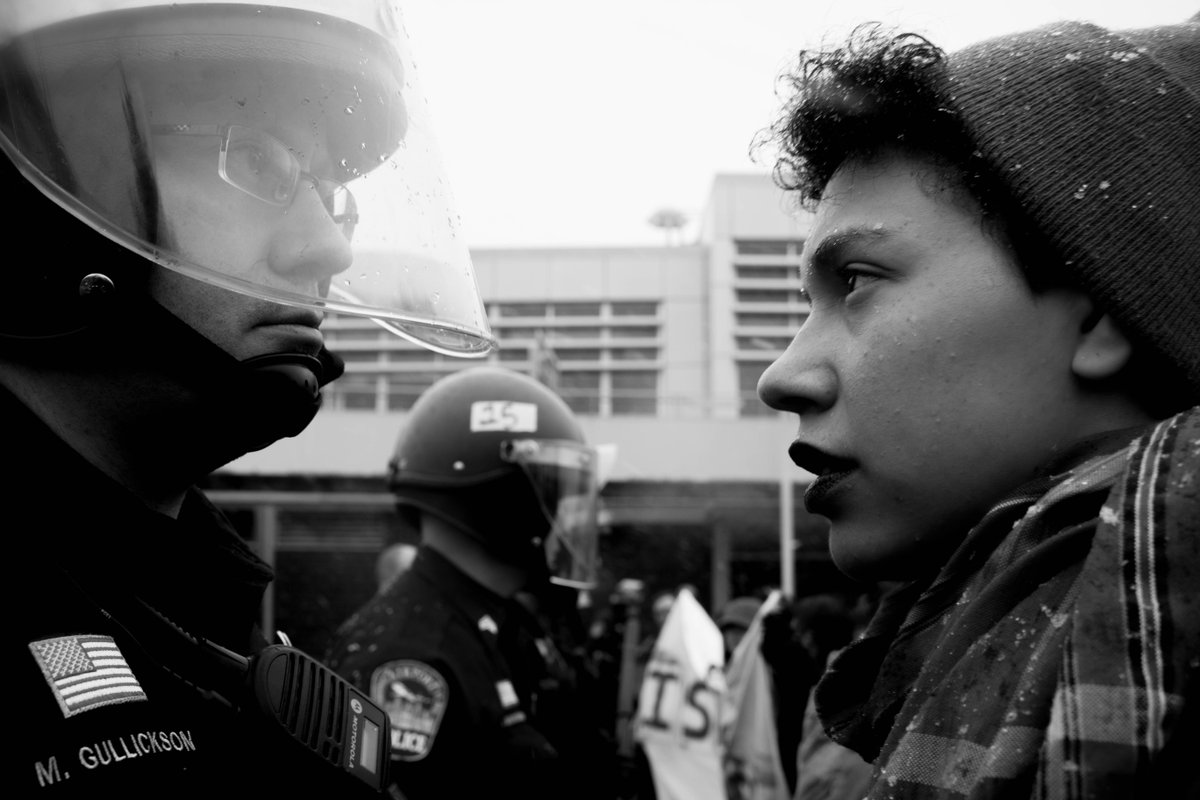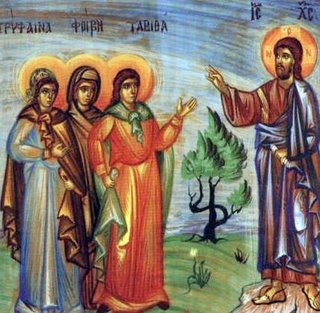"If you're going to beat me with a baton, you might as well look me in the eyes." -Vanessa Taylor
Photo credit: Patience Zalanga
On December 23, 2015 the Minneapolis chapter of the national Black Lives Matter movement staged a peaceful protest that disrupted thousands of holiday shoppers and travelers at the Mall of America, the Minneapolis city light rail, and both terminals of the Minneapolis airport. On the busiest shopping day of the year (two days before Christmas), BLM released an official statement declaring December 23 as "Black Xmas."
"Black X-Mas is here and there will be no business as usual until we get accountabilityThis is an incredible step forward for BLM and their fight for justice, but as you can imagine, the white community was in an uproar.
for our dead, and justice for the living. Instead of buying gifts to fuel this system,
Black Xmas is a day of action to reject the degradation of Black families and communities by police, politicians, and predatory companies, and declare our inherent worth. We will disrupt business as usual until city, state, and federal budgets stop funding Black death and start funding Black future."
"You people are causing so many problems and you are ignorant racists."
"You all are a bunch of uncivilized fools!! Why don't you get off the tax payers dime, and get a job!! This is for all the lazy blacks and whites that spend their time whining about everything like children. Grow Up if you want respect!"
"You guys are a joke, get jobs, clean up your hoods, educate your children. Be a fucking father."I pulled these off the BLM Minneapolis chapter's Facebook page, where hundreds of similar hateful and racist posts exist.
The main issue people opposed to these protests have is that the actions at the airport caused people to miss flights home for Christmas. While I understand the inconvenience, the underlying message they are sending is that travel plans are more important than the continual suffering, oppression, and death of the Black community.
Protests in their very nature are meant to disrupt "business as usual." In addition to their demands for the release of the tapes of Jamar Clark's death, the prosecution of the police involved in his murder, no grand jury in that case, and the charging of white supremacists who shot five black protesters at the 4th Precinct shutdown, BLM protests so that those on the outside can understand how injustice disrupts their everyday. If you miss a flight you can catch another, but if your son, father, daughter, mother, sister, brother, husband, wife, cousin, aunt, uncle, grandpa, grandma, friend is murdered by unchecked police brutality, then that is a life lost that cannot be given back.
This is a legitimate organization with legitimate demands, actions, and protests. As a Christian, I cannot help but ask the question: what would Jesus do in this exact circumstance?
.......
Let's turn to Luke 10:25-37.
Just then an expert in the law stood up to test [Jesus], saying, "Teacher, what must I do to inherit eternal life?"
"What is written in the law?" He asked him, "How do you read it?"
He answered: Love the Lord your God with all your heart, with all your soul, with all your strength, and with all your mind; and your neighbor as yourself.
"You've answered correctly," He told him. "Do this and you will live."
But wanting to justify himself, he asked Jesus, "And who is my neighbor?"
Jesus took up the question and said: "A man was going down from Jerusalem to Jericho and fell into the hands of robbers. They stripped him, beat him up, and fled, leaving him half dead. A priest happened to be going down that road. When he saw him, he passed by on the other side. In the same way, a Levite, when he arrived at the place and saw him, passed by on the other side. But a Samaritan on his journey came up to him, and when he saw the man, he had compassion. He went over to him and bandaged his wounds, pouring on olive oil and wine. Then he put him on his own animal, brought him to an inn, and took care of him. The next day he took out two denarii, gave them to the innkeeper, and said, 'Take care of him. When I come back I'll reimburse you for whatever extra you spend.'
"Which of these three do you think proved to be a neighbor to the man who fell into the hands of the robbers?"
"The one who showed mercy to him," he said.
Then Jesus told him, "Go and do the same."
In order to understand the cultural significance of this story, let's explore the three men who travelled the road.
- The Priest and the Levite: these are two religious leaders within Jewish society. Many who were listening to this story would have initially identified with or aspired to be like these two characters.
- The Samaritan: the Jews and Samaritans had a less-than-friendly relationship. With cultural, religious, and ethnic differences these two people groups were taught to hate each other.
So when Jesus challenges the Jewish audience to be like the merciful Samaritan, they were probably initially defensive– because these are the people they were supposed to hate, right? And when he dared to present the religious leaders in a negative light, they were probably initially shocked– because these are the people they were supposed to admire, right?
Let's move this into our own context.
The Black community is continually being beaten and killed by the police community. Yet many white Christians and Christian leaders are standing by the wayside, even moving further away, pretending nothing is actually happening. According to the story of the Good Samaritan, what does Jesus want us to do?
BE LIKE THE SAMARITAN!
There are many instances when Jesus was traveling and his journey was "inconvenienced" by the marginalized demanding justice.
- The hemorrhaging woman who touched Jesus' garments as he was traveling to heal a dying girl: Luke 8:40-48
- The two blind men who followed Jesus on the road crying for mercy: Matthew 9:27-31
- The blind man who cried out to Jesus as he was traveling to Jericho: Luke 18:35-43
- The Canaanite woman who demanded the healing of her daughter as Jesus was withdrawing to Tyre: Matthew 15:21-28
The list could continue. Jesus never turned away from cries of injustice, even if it inconvenienced his travel plans. That being said, if Jesus was in a taxi on his way to the airport and missed his flight because of BLM demanding justice, I believe he would have gotten out of the taxi and stood in solidarity with them.
Jesus' very life was a peaceful protest to the unjust power systems of his day. Why do you think the majority of his followers were tax collectors, prostitutes, fishermen, women, and many other members of marginalized groups? Because the message he was teaching was one of justice, equality, mercy, and love. The religious elite were threatened by his movement because their power and privilege was threatened.
But guess what? In the rule and reign of God, there is no power structure, there is no privilege, and there is no oppression. All of humanity is one. So perhaps we should stand with the oppressed now, because one day "death will no longer exist; grief, crying, and pain will exist no longer, because the previous things have passed away." (Revelation 21:4) Some day, all will be made new– the valleys will be raised and the mountains made low.
.......
I am still learning how to be an ally, and I will always be learning how to love others and stand for justice. Yet the song Us For Them by Gungor has been very encouraging on this journey. It speaks to the solidarity and equality that the people of God are called to, and the life of love we ought to lead.
We reject the either or
They can't define us anymore
Cause if it's us or them
It's us for them
Prepare the way of the Lord
Wielding mercy like a sword
Every mountaintop will be made low
Know, He holds the earth like dust
And His judgement comes to us
And His judgement is love
May our judgement be love
True peace is not merely the absence of tension,
it is the presence of justice.
-Martin Luther King Jr.




